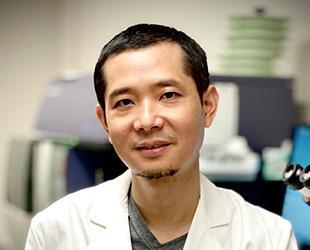AACR Grant Supports Glioblastoma Research
Glioblastoma is an aggressive form of brain cancer. Less than 5 percent of patients diagnosed with this cancer type will survive for five years or more.
Glioblastoma is notoriously difficult to treat, and new avenues for diagnosis and treatment are urgently needed. In 2016, an American Association for Cancer Research (AACR) grant was awarded to Yi Fan, MD, PhD, of the University of Pennsylvania, who is exploring the concept of vascular detransformation as a way to inhibit tumor growth.
Fan’s award, the AACR Judah Folkman Career Development Award for Angiogenesis Research, represents a joint effort to encourage and support a junior faculty researcher to conduct tumor angiogenesis research and to establish a successful career path in this field. In a recent interview, Fan discussed the ongoing impact this award has on his research group’s glioblastoma research initiatives:
What has inspired you to focus on glioblastoma research?

Many years ago when I was a medical student in Shanghai, I witnessed the cruelty by which cancer destroys entire families. I still remember a lovely young kid who suffered sorely from a brain tumor and the frustration I felt because there was barely anything I could do. Since then, I have made a lifetime commitment to the battle of fighting cancer. I later enrolled in a graduate program at the Cleveland Clinic, where I worked with Drs. Paul Fox and Jeremy Rich. Their visionary work inspired me to pursue an academic career and conduct cancer research with a focus on glioblastoma, the most lethal type of brain cancer.
What has been the impact of your AACR Judah Folkman Career Development Award on your career?
The AACR Judah Folkman Career Development Award offered me exciting opportunities to develop my scientific career. The initial results generated from this awarded project were published in JCI, Nature Communications, Science Translational Medicine, and Nature Cancer, and led to additional funding including two R01 grants from the National Institutes of Health and several other foundation awards. In addition, this award enhanced the visibility of our research and helped me recruit several talented graduate students and postdoc fellows.
How important to you, at that stage of your career, was the award? Did it allow you to do things you might not otherwise have done?
I was honored to receive the Judah Folkman Award from AACR as a junior faculty member because Dr. Folkman had been my hero—a pioneer of angiogenesis research. This award provided flexible funding that allowed me to explore an unconventional angle of antivascular therapy; namely, targeting genetic endothelial transformation, in contrast to conventional studies focusing on angiogenic factors. It is hard for a junior scientist to acquire traditional funds for a high-risk, but potentially impactful, research project. The Judah Folkman Award provided me a unique avenue to pursue this research idea.
What do you consider the most important scientific advances made, at least in part, because of your AACR Judah Folkman Career Development Award grant?
The Judah Folkman Award helped us develop a new therapeutic concept, namely, vascular detransformation, to combat cancer. The central idea is that tumor-associated endothelial cells acquire plasticity-mediated genetic reprogramming, leading to aberrant vascularity, tumor immunosuppression, and tumor resistance to anti-VEGF treatment and chemotherapy. We hope that, compared to conventional antivascular therapy that targets angiogenic factors, vascular detransformation may serve as a next-generation strategy as either monotherapy or in combination with chemoradiation or immunotherapy for cancer treatment.
How do you foresee the findings from your AACR Career Development Award impacting patients in the near and long-term future?
Built on the key findings from my Judah Folkman Award, we have screened the whole kinome and genome to identify therapeutic targets for vascular detransformation. One of these targets is Pak4, which reprograms the tumor vascular microenvironment and drives glioblastoma resistance to immunotherapy. We plan to initiate related clinical trials for human patients with glioblastoma and expect that Pak4 inhibition will improve the efficacy of T cell-based immunotherapy (such as chimeric antigen receptor (CAR) T-cell therapy). In the long-term future, we will test more of the identified targets and develop small- or big-molecule drugs to target vascular transformation and translate the findings into human clinic.
Since 1993, the AACR grants program has contributed to the development of new and improved approaches to cancer treatment and cure. What is your vision for the future of glioblastoma research? What areas of glioblastoma research remain underfunded?
I appreciate the tremendous effort made by the AACR to support cancer research, including their generous support of early-stage scientists. As for glioblastoma research, future success may rely on the deep understanding of tumor complexity, plasticity, and immunity and their spatiotemporal regulation, which will ensure we develop integrated, effective therapeutic approaches. I think that the multidimensional interaction between tumor stroma, immune cells, and neoplastic cells is central to tumorigenesis and immune escape, representing a potentially key node for clinical intervention, which is, however, an underfunded field. Finally, as glioblastoma is one of most deadly human cancer types, the findings from glioblastoma research will provide important clues that can also contribute to treatment advances in a variety of solid tumors, particularly those immunological cold tumors such as pancreatic and prostate cancers.



